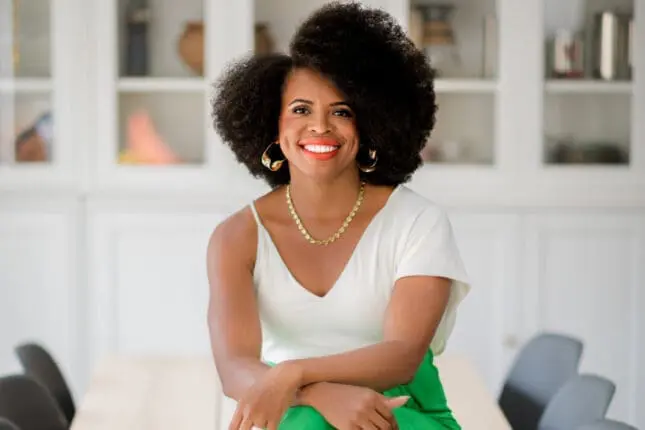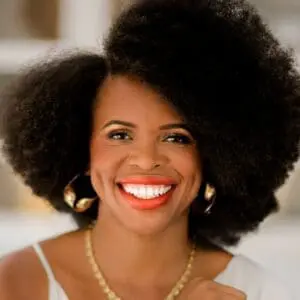As a field, we’re finally coming around to acknowledging an increasingly undeniable reality: climate change isn’t just an environmental, economic, political, and social justice issue. More and more, it’s surfacing in our clients’ lives as a relational boundary issue.
In other words, whether it’s about rinsing out a plastic bag instead of throwing it away or buying the latest electric car model, differing views on personal, environmental choices can obstruct our most important relationships, particularly when people’s passions are inflamed. How do we help clients navigate these issues?
To explore and understand this question more deeply, we spoke with Nedra Glover Tawwab, a therapist widely known for her expertise on boundaries and relationships. Not only has she written several bestselling books on boundaries, but Time magazine recently named her one of the 100 most influential people in health today. Her thoughts on how to balance advocacy with respect, clinical self-disclosure with a client focus, and being true to environmental values while respecting others’ autonomy may surprise you.
Livia Kent: Do concerns over environmental issues ever come up in your practice?
Nedra Glover Tawwab: Not with my clients, but some of my colleagues have seen it in their practice. That said, I haven’t taken on any new clients in a long time, and I think this may be a newer issue to come up in therapy.
LK: I’m wondering about your thoughts on an issue I heard about the other day. It goes something like this: a client shows up at a family reunion where Cousin Jimmy has brought a 200-pack of bottled water. This client is deeply concerned about single-use plastics; Cousin Jimmy is clearly not. What happens in terms of relational boundaries?
Glover Tawwab: Some of us are more paper-towel conscious; some of us aren’t. Some of us have electric cars; some of us don’t. I happen to compost, and that’s weird to a lot of people. People in relationships will always have differing views on things. It may cause some arguments, and usually requires some uncomfortable conversations and boundary-setting. So if you know that Cousin Jimmy is going to grab Costco’s biggest case of bottled water, you may say, “Hey, this year I’m going to bring some reusable bottles for everyone.”
You’re not trying to change Cousin Jimmy’s mind on anything, and you’re not putting the responsibility of upholding your environmental priorities on him. But you’ll be able to comfortably exist at that reunion, and so will Jimmy.
Sometimes we feel like in order to be in a relationship, we have to get the other person to adopt our perspective, which is also a boundary violation. You have to think like me to be my partner or even my friend. Cousin Jimmy may have some wonderful qualities; plastic usage is not one of them, but you can like him for the other things. When I had my first daughter, I used cloth diapers and I put that responsibility on me and not my partner because it was very important to me and not as important to my partner, who was more willing to just go buy a case of disposable diapers.
I think that’s the hard part. We try to get people to buy into our stuff and when they’re serious about their own perspective, we get upset; we get resentful. But the thing is, they also get to have their boundary. And their boundary might be, I’ll get a case of disposable diapers because I don’t want to wash poopy diapers. So how do we figure out what’s our stuff to own in these interactions as we exist in the world with other people, maybe in an office environment where everybody’s using plastic forks and cups? Do we want to say, “Hey, let’s use silverware and mugs, and wash them in the sink after lunch instead of throwing plastic away.” Therapists are probably open to those kinds of conversations, but in other environments, I can imagine certain people might be like, “I’m not washing dishes at lunch. I’m busy.” So you might have to say, “I’ll wash them because this issue is really important to me.”
LK: I can picture myself as that person, saying, “I’ll wash the dishes at lunch because it’s more important to me than anyone else.” And then I can picture myself standing at the sink, washing everyone’s mugs, seething with resentment and anger. What do I do?
Glover Tawwab: I think it’s important to remind yourself of your values—that these are your values. You’re doing this task because it’s important to you. There are certain things I really care about, and other things I really don’t care about. We can’t have 100 percent participation with every action we decide to take. We can allow ourselves to feel the resentment, but we have to be honest about the fact we can’t make other people think exactly like us. Still, being an example can be powerful. We forget how influential we can be just by being a living example of our values.
LK: A therapist writes in this magazine issue about a client who saw a bunch of Amazon packages in her waiting room and got really angry at her for supporting a company whose business and environmental practices he didn’t agree with. How would you have handled that?
Glover Tawwab: My message to all clients is: I’m here to work with you, not agitate you. So if Amazon packages are an agitation for you, now I know to be conscious of that before you come into this space. I don’t think it’s appropriate or necessary to share our personal views with clients because this space is about them, not us. They don’t need to know why I’m ordering a bunch of things from Amazon instead of buying at a local business. How does my explanation help them in their therapy? Sharing my perspective might make me feel better, but it’s not necessary for them.
I’m from Detroit, and when I moved to Charlotte, North Carolina, Barack Obama had just been elected president. I was working in a rural area, where people would come in and try to agitate me. They’d say mean things about him, and I’d just let them talk. I didn’t have to share my political preference. I understand you saw something on the news, and you feel triggered by this thing. It doesn’t matter what I think about it because this is not my space. This is your space. You can tell me all the terrible things you think about this person. I’m not Barack Obama’s cousin; I’m not going to call him. You get to complain about whatever you want. It’s your time. If you want to talk about how much you hate the color gold while I’m wearing gold earrings, it’s not going to make me like gold any less.
LK: How do you help clients—or yourself—figure out when it’s good to speak up and stand firm versus just be flexible?
Glover Tawwab: Some conversations require more attention and effort than others, so ask, Is this something that needs to be addressed in this moment, or is it something that needs to be tabled? We might feel angry or offended, but is this the time or space to talk about it? Sometimes we don’t think about a boundary as a conversational thing. We think about it as tapping someone on the nose and saying, You can’t have plastic here anymore.
I think we have to get really creative with how we have those conversations sometimes. Just having a lot of cloth towels around may discourage a person from using paper towels more than lecturing them would. So you could gift them some. I sent you a whole bundle of pink reusable towels because you love pink. Merry Christmas.
LK: I wanted to pick your brain about information burnout, or maybe we could call it empathy burnout, when it comes to news about climate-related disasters. Sometimes I find myself ignoring all the articles coming up in my feed about those kinds of things. I should read them. But it feels like too much, and I just have to get through the day. What would you tell a client in a similar situation?
Glover Tawwab: I think you have to assess where you are. Sometimes more information is good for us. We’re learning, we’re spreading the news, we’re advocating. And then there are other times when we find ourselves losing sleep or getting anxious, unable to think or talk about anything else other than the thing. At that point, you have to assess how much information is helping you and how much is harming you—and what you can manage.
LK: Do therapists have a larger civic obligation to move this issue forward in any way?
Glover Tawwab: Yes. And I think you do it by showing people what’s important in your space: plants, reusables, rain barrels, compost bins, whatever. Set up your therapy space in a way that matches your values. You don’t have to talk about it, but clients will see what’s important to you, and perhaps emulate it in some way, or at least get curious about it.
Nedra Glover Tawwab
Nedra Glover Tawwab is a New York Times bestselling author, licensed therapist, and sought-after relationship expert. She has practiced relationship therapy for 14 years and is the founder and owner of the group therapy practice, Kaleidoscope Counseling. Every day she helps people create healthy relationships by teaching them how to implement boundaries. Her philosophy is that a lack of boundaries and assertiveness underlie most relationship issues, and her gift is helping people create healthy relationships with themselves and others. Learn more on her website.
Livia Kent
Livia Kent, MFA, is the editor in chief of Psychotherapy Networker. She worked for 10 years with Rich Simon as managing editor of Psychotherapy Networker, and has collaborated with some of the most influential names in the mental health field on stories that have become widely read articles and bestselling books. She taught writing at American University as well as for various programs around the country. As a bibliotherapist, she’s facilitated therapy groups in Washington, DC-area schools and in the DC prison system. In 2020, she was named one of Folio Magazine’s Top Women in Media “Change-Makers.” She’s the recipient of Roux Magazine‘s Editor’s Choice Award, The Ledge Magazine‘s National Fiction Award, and American University’s Myra Sklarew Award for Original Novel.














